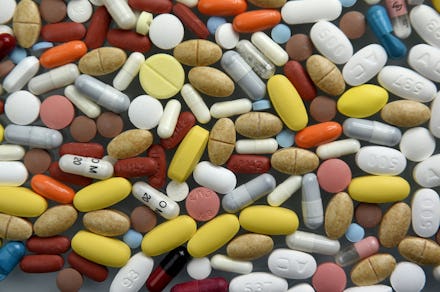The Future of Therapy Involves a Little Bit of MDMA

Five years from now, your doctor could be prescribing you MDMA — the drug that's supposed to be in ecstasy — for post-traumatic stress disorder. In 10 years, you could be taking it for anxiety.
The Multidisciplinary Association for Psychedelic Studies wants to use methylenedioxymethamphetamine, better known as MDMA or Molly, within psychotherapy sessions as an aid in treating various mental maladies.
The organization is currently wrapping up phase 2 of its Food and Drug Administration clinical trials on MDMA-assisted psychotherapy for PTSD patients. In 2017, the organization will push into phase 3 of its FDA clinical trials, which means government officials could issue a verdict on the drug's use as soon as 2021.
It's known as a party drug. MDMA has a reputation for making people feel more open, and it's closely associated with sex (in the bedroom, on an open dance floor, in the midst of a music festival and, of course, inside a tent at Burning Man).
But researchers argue that the party drug version of MDMA isn't likely to contain much (if any) actual MDMA. Used clinically, actual MDMA has shown some compelling results.
One of MAPS' studies involved 19 women who suffered from PTSD as a result of sexual assault. In that study, 83% of those who received psychotherapy with MDMA did not qualify for a PTSD diagnoses after their treatment was over, said Brad Burge, director of communications and marketing at MAPS, in a phone interview.
Burge also noted that of those who had received the same psychotherapy treatment with a placebo, 25% didn't qualify for a PTSD diagnosis afterward.
"The therapy itself is really good," Burge said. MAPS only chooses participants that have chronic or treatment-resistant PTSD.
How it works: The drug affects the amygdala, an area of the brain that is tied to a person's fight or flight response. Under the effects of MDMA and psychotherapy, patients' fear response can theoretically be lowered so they can work through their traumatizing experiences.
Meanwhile, MAPS therapists use a specialized form of treatment that pulls from various existing methodologies, including behavioral and internal family systems.
Patients are required to do six to eight psychotherapy sessions over the course of three months. Each patient is paired with two psychotherapists, one male and one female, with whom they meet in tandem. During two to three of those sessions, the patient takes MDMA. Since the effects of the drug can last six to eight hours, patients start early, taking the drug in the morning before heading into a session with their therapist. After the MDMA-augmented meetings, patients are required to spend the night on premise at the clinic.
Burge notes that trust is an important factor within the session, which is why patients are required to do several psychotherapy sessions ahead of their MDMA-assisted moment.
Not just anyone will be able to administer MDMA-accompanied psychotherapy. Burge says a certification process will have to be put in place for professional licensed therapists who want to use MDMA.
The side effects: Patients can become very anxious on the drug and may experience some teeth grinding. But as the psychotherapists lead patients through the session, these symptoms tend to wear off, says Burge.
And what about that comedown? Burge says there isn't really one. He says though MDMA does cause the brain to release a lot of stored serotonin and oxytocin, psychotherapists are able to mitigate some of the effects of that depletion. To counteract any feelings of withdrawal, psychotherapists recommend that patients take a few days off of work post-MDMA-induced therapy and engage in "self-care."
However, other earlier studies indicate that MDMA might not be so innocent a drug. The National Institute on Drug Abuse, citing existing studies, notes that MDMA can cause damage to neurons containing serotonin and may cause long-lasting impairment to the brain. But in recent years, additional studies have challenged these findings.
When can I take MDMA? MAPS is meeting with the FDA in the spring of 2016 to discuss the parameters for phase 3 clinical trials. Once initiated, these trials will take four years to complete. Speculatively, Burge said this treatment might cost anywhere from $3,000 to $10,000 for the full three-month treatment course, including inpatient costs.
If the FDA does approve the use of MDMA in PTSD-related psychotherapy, MAPS hopes it will open the door to other use cases. The organization is already exploring the use of MDMA in psychotherapy treatments involving patients who are experiencing anxiety as a result of a life-threatening illness, like cancer. It's also looking into MDMA as a tool for helping autistic adults to learn social skills, Burge said. Both of those use cases are currently in phase 2 clinical trials, so it will be a while longer before they're up for FDA approval.
In the meantime, MAPS has just purchased $400,000 worth of MDMA for its phase 3 trials. To pay for the bulk purchase, the organization is hosting a series of dinners.
Correction: March 29, 2016